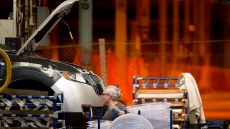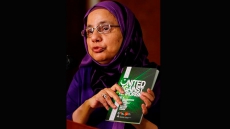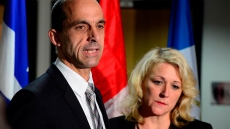TORONTO - The revelation that a man with Ebola was diagnosed in a Texas hospital could be seen as the first case of the dreaded disease discovered in North America.
Or you could see it as an ember, flying far from a raging conflagration.
Disease experts in North America insist that the health systems in the United States and Canada are sufficiently different — more advanced, blessed with steady supplies of clean needles, protective equipment and clean water — that the ember in Dallas is not likely to start to blaze.
But they also warn that as long as West Africa is engulfed in the worst Ebola outbreak the world has ever seen, such embers will continue to fly.
Will they land in the slums of Nairobi, Kenya? Mumbai, India? The banlieues of Paris? It's anyone's guess, but that they will continue to scatter seems inevitable, experts say.
And that means the world's only choice is to urgently mount the response needed to slow and eventually stop the spread of a virus that may be killing as many as 70 per cent of people being infected, they insist.
"The best way to sum it up in my mind is a good offence in West Africa is the best defence for everyone else. And that's ultimately what has to happen," says Dr. Kamran Khan, a Toronto-based expert who uses global flight data to predict spread of infectious diseases.
The international president of Medecins Sans Frontieres, which has taken the medical lead on this and all recent Ebola outbreaks, puts it more bluntly.
"If you don't want this to spread further, you need to increase the means locally to treat and contain the epidemic," Dr. Joanne Liu says.
"The best way to contain the epidemic of Ebola is by increasing the response locally. It's not by barricading ourselves in our home countries and cutting the air flights."
Reached on a plane about to depart Montreal for Geneva on Tuesday night, Liu said the Dallas case will show North Americans a little bit of what all the fuss has been about.
Local and state health authorities, aided by the U.S. Centers for Disease Control, will spend days figuring out the man's every move from the time he entered the United States (on Sept. 20) to the time he transferred to an isolation room at Texas Health Presbyterian Hospital (Sept. 29).
They will also have to find everyone with whom he had contact, and monitor those people's health for 21 days after the exposure, Ebola's at-times lengthy incubation period. If any of them become sick, their movements will be traced and contacts added to the list of people being monitored for 21 days.
While everyone will be crossing fingers that there are no secondary cases, that may not be realistic. CDC Director Dr. Tom Frieden warned Tuesday the man may have passed the virus on, though Frieden said he is convinced spread won't get out of control.
This will undoubtedly amount to hundreds of person-hours of work and cost tens of thousands of dollars, if not more. All to ensure this one ember does not ignite flickering flames.
"When you're going to multiply that by 6,300 people, they will realize why we're behind today," Liu said, her voice layered with exhaustion and frustration.
The group has been begging for more help in the field for months and has criticized governments for being slow to see the scale of the disaster and to get promised assistance into place.
In a briefing for journalists on Tuesday, executive director Sophie Delaunay said MSF is currently on an exploratory mission to the Ivory Coast. The reason: it wants to see what would be needed to mount a response there, if Ebola slips over the Liberian or Guinean borders. MSF has some concerns, she admitted, that this may have already happened.
Delaunay said MSF feels "desperate and powerless" to stop the spread of Ebola in the three countries — those two, plus Sierra Leone — where the outbreak is blazing, but hopes they could contain spread if the virus crosses into vulnerable nearby countries like Ivory Coast. Recent incursions into Senegal and Nigeria were, it seems, successfully halted.
Experts here feel confident the risk remains low that Canada will see a case, though Khan said that the larger the outbreak grows, the greater the risk becomes.
Currently travel to Canada makes up only about 1.5 per cent of all international travel from the three outbreak countries, with about half of that going to Quebec, said Khan, who practises at St. Michael's Hospital. The rest of the travel to Canada from those countries is spread among other provinces.
But should the outbreak expand further, the mathematics change.
"Then the likelihood of spread to different parts of the world, possibly including Canada, may look very different than they do currently," Khan said.
And I do think if things persist or they grow then it probably is just a matter of time before we will see the odd case imported into a country like Canada."
Even if a case should come to Canada, health officials think it would be contained. The precautions hospitals in the developed world take to prevent spread of diseases within their walls should be enough to keep Ebola in check, said Dr. Allison McGeer.
The head of infection control for Toronto's Mount Sinai Hospital, she pointed to things like the spacing of patient beds, the regular cleaning of rooms, hand-washing rules, personal protective equipment and needles designed for safe use and disposal.
As well, hospitals and health systems have been planning for Ebola — and the Texas case will inspire them to spend even more time on preparedness.
"On balance I think it's a good idea for all of us if what this does is send us back to the table to practise things and do things better. But what it doesn't do is fundamentally alter the size of the risk or the level of concern we should have in North America."
That's because our problem isn't here. It's in West Africa.
"There's no important message about risk to North Americans from this (case in Dallas) but there's a very important message about risk to people in West Africa and we really need urgently, all of us, to be ramping up the response to that outbreak," McGeer said.





